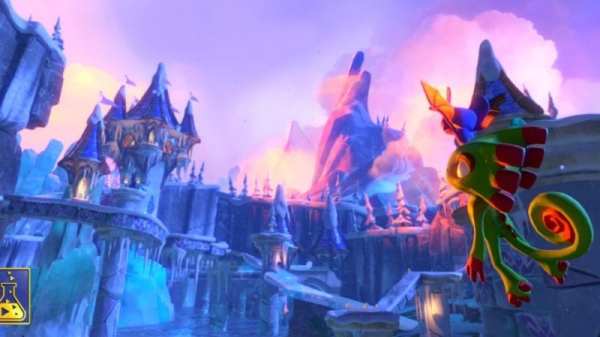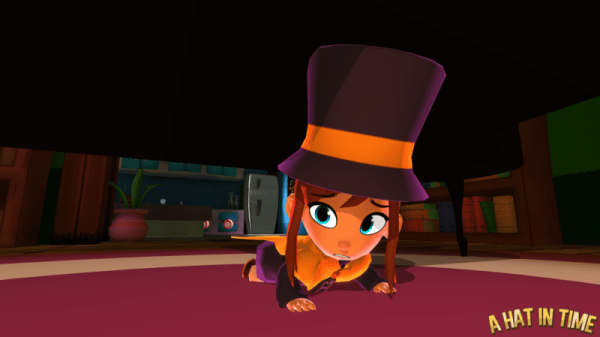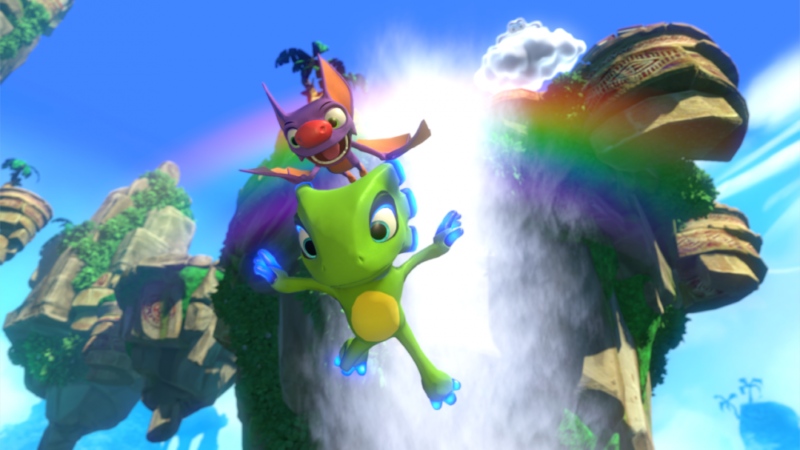Simply wishing a sequel or spiritual successor into existence isn’t enough. The people at Playtonic currently working on Banjo-Kazooie spiritual successor, Yooka-Laylee, are fully aware that fans have wanted some kind of follow up for a while now; especially lead composer Grant Kirkhope, who took some time at E3 2016 to chat with Twinfinite about the project’s development.
Yooka-Laylee actually being a thing that is really happening is a video game industry miracle, one that needed so many jiggies to fall in just the right place. In reality, these games are made by people, not brand name companies. This is probably why we’ve yet to see Microsoft pull the trigger on a new Banjo-Kazooie since Nuts and Bolts despite owning Rare. The team at Rare currently working on Sea of Thieves is totally different than the one from the 90s. For a true Banjo-Kazooie spiritual successor to happen as it is now, as much of the original team as possible needed to reunite.
Kirkhope, who is very visible on social media and describes himself as “the person everyone was used to going to, to kind of moan about Banjo-Kazooie,” was able to talk about how Playtonic was able to form, and deliver a game that fans have wanted for years.

The formation of Playtonic and Yooka-Layee’s Kickstarter launch wasn’t the first attempt to get the Banjo-Kazooie gang back together. Way back in 2012, a group of ex-Rare employees created a Twitter account (now defunct) under the alias Mingy Jongo (Mumbo Jumbo’s evil robot twin), and cryptically teased a spiritual successor for a bit.
Kirkhope referenced the initial failed attempt in his interview with us, mentioning that they had a “little demo going, and the idea was to try and work on it in our spare time.” Sadly though, Kirkhope acknowledged that no one ended up having the free time for it. “It kind of started to fall flat. And I thought that was it.”
Sadly, a one way trip to the void is the fate for a lot of great video game ideas. Luckily for Banjo fans though, that setback didn’t kill the dream forever.
“And then, a fortunate set of disasters got Playtonic together.”
“Rare had a round of layoffs,” Kirkhope said. “They laid off some great people; and some people left at the same time. So it was the first time that the core team of Banjo-Kazooie was available.”
This was their unfortunate but timely window of opportunity. Core team members united, including Chris Sutherland and Gavin Price, two of Rare’s most experienced employees when it comes to the Banjo-Kazooie games. The team grew to include even more ex-Rare and Banjo-Kazooie veterans, names like Steve Mayles, Steven Hurst and many others.
However, according to Kirkhope, it was Price who “put his balls on the line” to make Playtonic happen. As the story goes, Price owned a cake shop with his wife and through his work there, had more business experience than the rest of the ex-Rare crew, specifically with getting business loans. It was a risk that Price took and as Kirkhope said to us, “all hats off to him,” because if he didn’t take that chance, it sounds like Playtonic and Yooka-Laylee may not have happened.
“I think if it was left to the rest of us, it would have fallen to the wayside, because he had been used to doing [this] with the Cake Shop, as bizarre as it is, he’s used to business, he’s used to all that stuff, and put it together.” said Kirkhope
The rest really is history. Playtonic was formed and launched Yooka-Laylee with a Kickstarter that crushed all expectations. “I think we were asking for like $270,000, and I think we all thought we would get it in a couple of weeks,” said Kirkhope of the funding launch.
They met their goal in 40 minutes, and finished the campaign with over £2 million.
Yooka-Layee’s rise begs the question, though: Why did it take so long for someone to take another chance on the collect-a-thon genre?

Granted, indie projects such as the in-development A Hat in Time are out there; however, these types of games from people as experienced (and funded) as the Playtonic crew are quite rare. Kirkhope believes it has something to do with how trends cycle. “I just think it’s a bit like the music industry,” said Kirkhope on genres falling out and back into popularity. He continues:
“You got the 70s the 80s and the 90s where it was very fixed right. You had grunge in the 90s, metal in the 80s, disco in the 70s and then it just falls out of favor. And then people get a few years past it and go, ‘you know that was pretty good, I used to quite like that.’ So you get a lot of 80s bands back again. I like to think that now, you know, all the old metal bands like Whitesnake are out there touring again even though they are all like 75, right? Because people want to see them still, they want to remember and I think that’s what happens. That you get to a certain distance away from the thing and people go, I really liked that.”

What that all boils down to is nostalgia, and how generations employ it when evaluating their past. At some point, the collective of 90s gamers all kind of realized around the same time in 2015 that they really enjoyed games like Banjo-Kazooie, that they want them to make a comeback. “I think there’s a finite window, maybe five to thirteen/fourteen [years old], where you remember that forever,” Kirkhope says of the games we grew up with.
Now that games are maturing as an industry, and publishers are getting better at figuring out what consumers want, Kirkhope is hopeful that all genres will be able to thrive at the same time. That fans of forgotten genres like the collect-a-thon won’t have to suffer through another drought.
“I think we’re at that point now, where everything is going to co-exist. Ariana Grande next to Metallica, next to Pantera next to Madonna. Everyone is co-existing at the same time, and I think games are going to get to that point where you’re going to see all the genres all the time. Which is great.” said Kirkhope
Here’s hoping that’s the case! Yooka-Laylee is due out in Q1 of 2017. You can check out our E3 preview of the game here.













Updated: Jun 28, 2016 04:10 pm